Analysis of the Likely Effects of Brexit on the UK Economy (QHA303)
VerifiedAdded on 2022/08/31
|9
|2578
|13
Report
AI Summary
This report examines the likely effects of Brexit on the UK economy, analyzing the historical context of the European Union and the events leading up to the Brexit referendum. It discusses the challenges faced by the UK as an EU member, including immigration, and the withdrawal negotiations. The report delves into the impact of Brexit on economic growth, trade, and employment, highlighting both short-term and long-term consequences. It explores how Brexit affects trade relationships, potential tariffs, and the UK's access to the EU single market. The report concludes by summarizing the anticipated effects of Brexit on various sectors of the UK economy, drawing from multiple sources to provide a comprehensive overview of the economic implications of the UK's departure from the European Union.
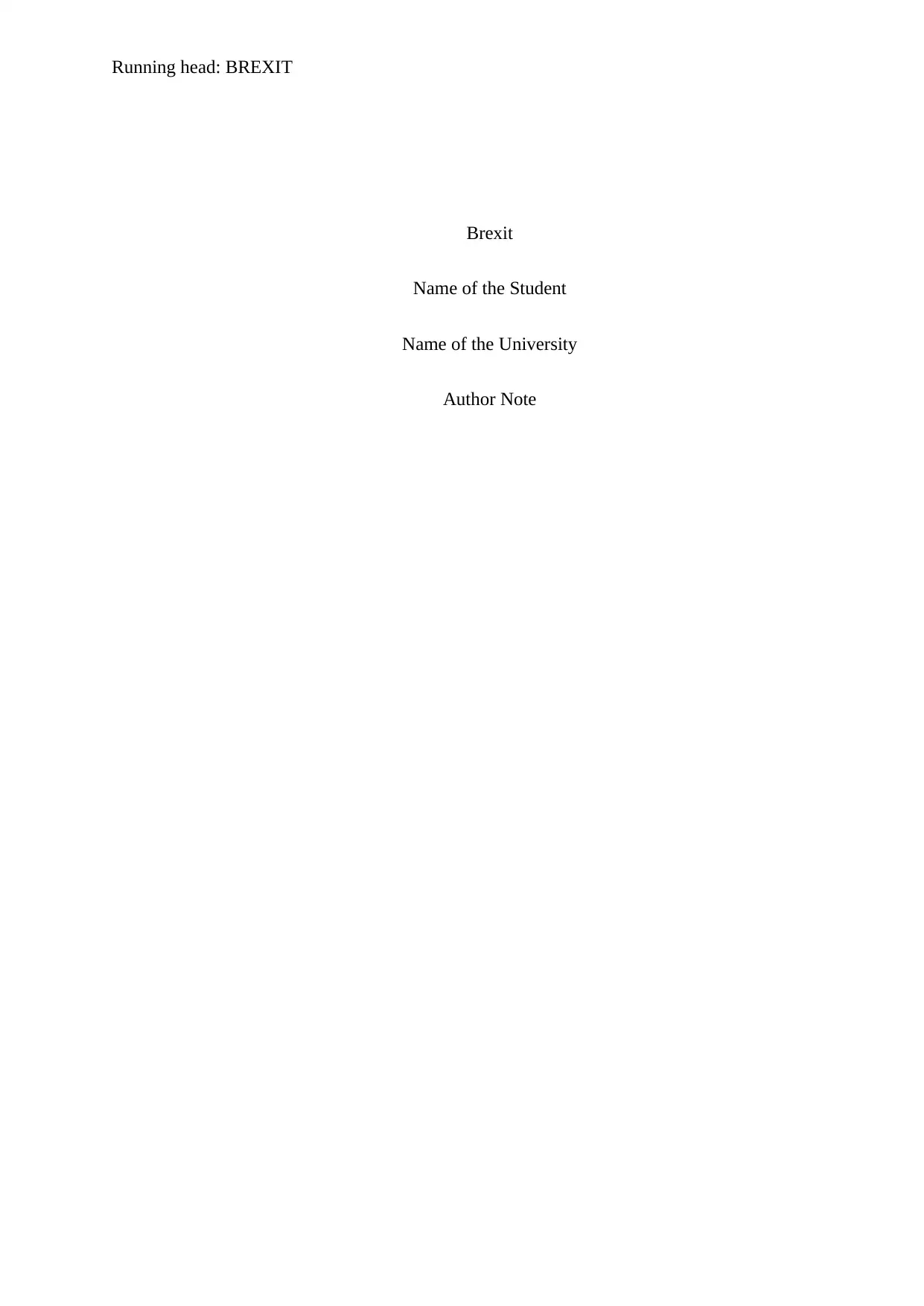
Running head: BREXIT
Brexit
Name of the Student
Name of the University
Author Note
Brexit
Name of the Student
Name of the University
Author Note
Paraphrase This Document
Need a fresh take? Get an instant paraphrase of this document with our AI Paraphraser
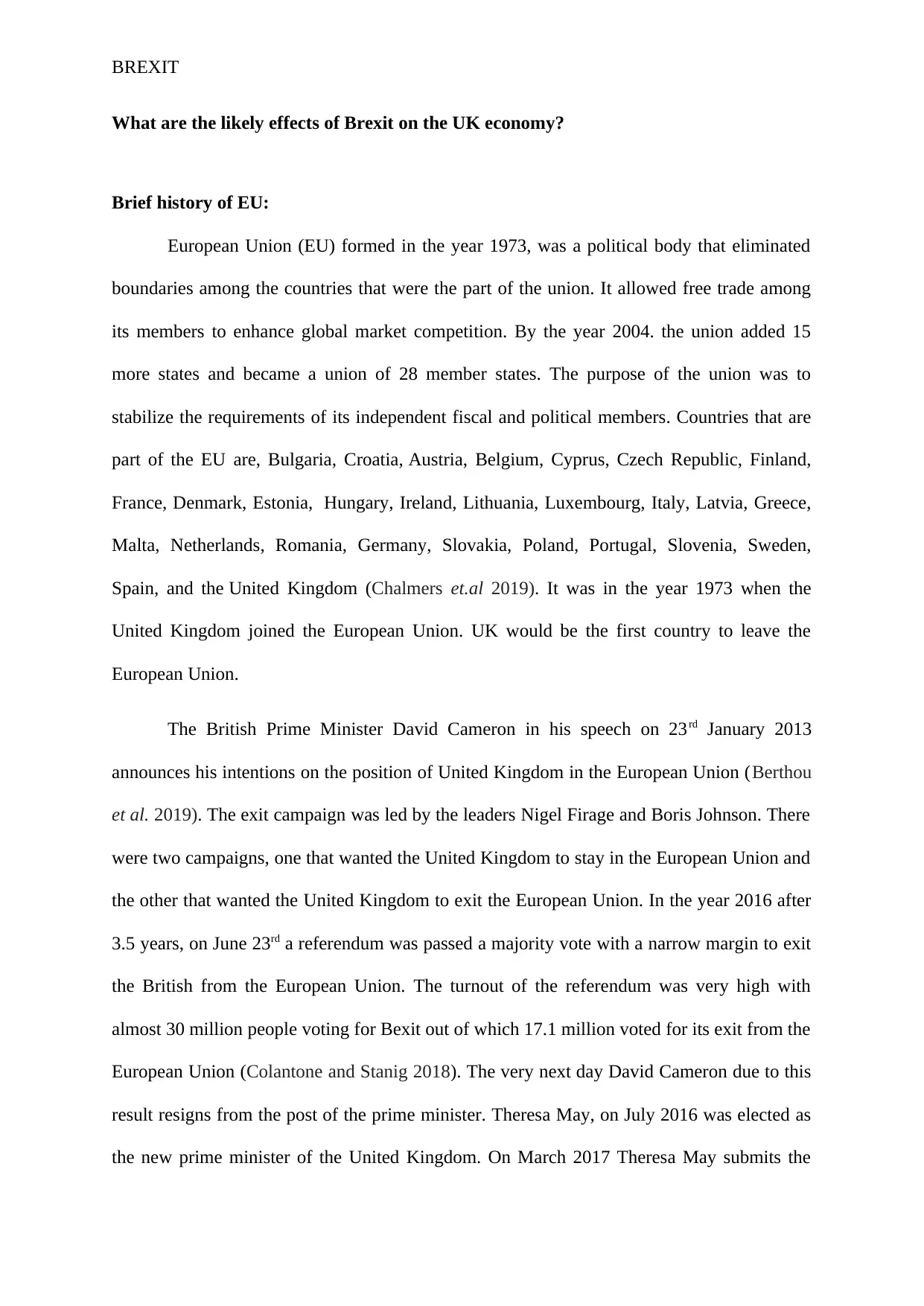
BREXIT
What are the likely effects of Brexit on the UK economy?
Brief history of EU:
European Union (EU) formed in the year 1973, was a political body that eliminated
boundaries among the countries that were the part of the union. It allowed free trade among
its members to enhance global market competition. By the year 2004. the union added 15
more states and became a union of 28 member states. The purpose of the union was to
stabilize the requirements of its independent fiscal and political members. Countries that are
part of the EU are, Bulgaria, Croatia, Austria, Belgium, Cyprus, Czech Republic, Finland,
France, Denmark, Estonia, Hungary, Ireland, Lithuania, Luxembourg, Italy, Latvia, Greece,
Malta, Netherlands, Romania, Germany, Slovakia, Poland, Portugal, Slovenia, Sweden,
Spain, and the United Kingdom (Chalmers et.al 2019). It was in the year 1973 when the
United Kingdom joined the European Union. UK would be the first country to leave the
European Union.
The British Prime Minister David Cameron in his speech on 23rd January 2013
announces his intentions on the position of United Kingdom in the European Union (Berthou
et al. 2019). The exit campaign was led by the leaders Nigel Firage and Boris Johnson. There
were two campaigns, one that wanted the United Kingdom to stay in the European Union and
the other that wanted the United Kingdom to exit the European Union. In the year 2016 after
3.5 years, on June 23rd a referendum was passed a majority vote with a narrow margin to exit
the British from the European Union. The turnout of the referendum was very high with
almost 30 million people voting for Bexit out of which 17.1 million voted for its exit from the
European Union (Colantone and Stanig 2018). The very next day David Cameron due to this
result resigns from the post of the prime minister. Theresa May, on July 2016 was elected as
the new prime minister of the United Kingdom. On March 2017 Theresa May submits the
What are the likely effects of Brexit on the UK economy?
Brief history of EU:
European Union (EU) formed in the year 1973, was a political body that eliminated
boundaries among the countries that were the part of the union. It allowed free trade among
its members to enhance global market competition. By the year 2004. the union added 15
more states and became a union of 28 member states. The purpose of the union was to
stabilize the requirements of its independent fiscal and political members. Countries that are
part of the EU are, Bulgaria, Croatia, Austria, Belgium, Cyprus, Czech Republic, Finland,
France, Denmark, Estonia, Hungary, Ireland, Lithuania, Luxembourg, Italy, Latvia, Greece,
Malta, Netherlands, Romania, Germany, Slovakia, Poland, Portugal, Slovenia, Sweden,
Spain, and the United Kingdom (Chalmers et.al 2019). It was in the year 1973 when the
United Kingdom joined the European Union. UK would be the first country to leave the
European Union.
The British Prime Minister David Cameron in his speech on 23rd January 2013
announces his intentions on the position of United Kingdom in the European Union (Berthou
et al. 2019). The exit campaign was led by the leaders Nigel Firage and Boris Johnson. There
were two campaigns, one that wanted the United Kingdom to stay in the European Union and
the other that wanted the United Kingdom to exit the European Union. In the year 2016 after
3.5 years, on June 23rd a referendum was passed a majority vote with a narrow margin to exit
the British from the European Union. The turnout of the referendum was very high with
almost 30 million people voting for Bexit out of which 17.1 million voted for its exit from the
European Union (Colantone and Stanig 2018). The very next day David Cameron due to this
result resigns from the post of the prime minister. Theresa May, on July 2016 was elected as
the new prime minister of the United Kingdom. On March 2017 Theresa May submits the
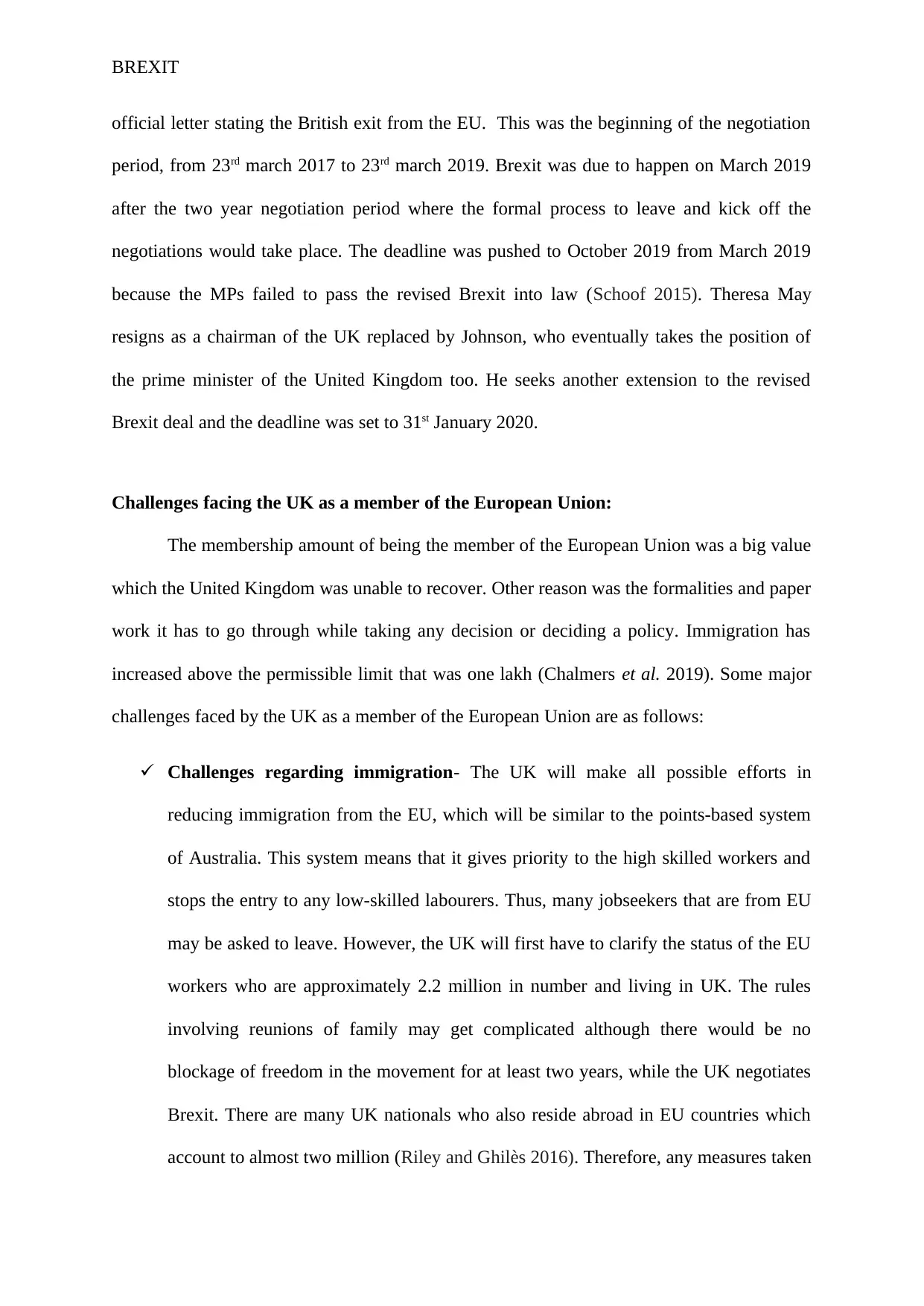
BREXIT
official letter stating the British exit from the EU. This was the beginning of the negotiation
period, from 23rd march 2017 to 23rd march 2019. Brexit was due to happen on March 2019
after the two year negotiation period where the formal process to leave and kick off the
negotiations would take place. The deadline was pushed to October 2019 from March 2019
because the MPs failed to pass the revised Brexit into law (Schoof 2015). Theresa May
resigns as a chairman of the UK replaced by Johnson, who eventually takes the position of
the prime minister of the United Kingdom too. He seeks another extension to the revised
Brexit deal and the deadline was set to 31st January 2020.
Challenges facing the UK as a member of the European Union:
The membership amount of being the member of the European Union was a big value
which the United Kingdom was unable to recover. Other reason was the formalities and paper
work it has to go through while taking any decision or deciding a policy. Immigration has
increased above the permissible limit that was one lakh (Chalmers et al. 2019). Some major
challenges faced by the UK as a member of the European Union are as follows:
Challenges regarding immigration- The UK will make all possible efforts in
reducing immigration from the EU, which will be similar to the points-based system
of Australia. This system means that it gives priority to the high skilled workers and
stops the entry to any low-skilled labourers. Thus, many jobseekers that are from EU
may be asked to leave. However, the UK will first have to clarify the status of the EU
workers who are approximately 2.2 million in number and living in UK. The rules
involving reunions of family may get complicated although there would be no
blockage of freedom in the movement for at least two years, while the UK negotiates
Brexit. There are many UK nationals who also reside abroad in EU countries which
account to almost two million (Riley and Ghilès 2016). Therefore, any measures taken
official letter stating the British exit from the EU. This was the beginning of the negotiation
period, from 23rd march 2017 to 23rd march 2019. Brexit was due to happen on March 2019
after the two year negotiation period where the formal process to leave and kick off the
negotiations would take place. The deadline was pushed to October 2019 from March 2019
because the MPs failed to pass the revised Brexit into law (Schoof 2015). Theresa May
resigns as a chairman of the UK replaced by Johnson, who eventually takes the position of
the prime minister of the United Kingdom too. He seeks another extension to the revised
Brexit deal and the deadline was set to 31st January 2020.
Challenges facing the UK as a member of the European Union:
The membership amount of being the member of the European Union was a big value
which the United Kingdom was unable to recover. Other reason was the formalities and paper
work it has to go through while taking any decision or deciding a policy. Immigration has
increased above the permissible limit that was one lakh (Chalmers et al. 2019). Some major
challenges faced by the UK as a member of the European Union are as follows:
Challenges regarding immigration- The UK will make all possible efforts in
reducing immigration from the EU, which will be similar to the points-based system
of Australia. This system means that it gives priority to the high skilled workers and
stops the entry to any low-skilled labourers. Thus, many jobseekers that are from EU
may be asked to leave. However, the UK will first have to clarify the status of the EU
workers who are approximately 2.2 million in number and living in UK. The rules
involving reunions of family may get complicated although there would be no
blockage of freedom in the movement for at least two years, while the UK negotiates
Brexit. There are many UK nationals who also reside abroad in EU countries which
account to almost two million (Riley and Ghilès 2016). Therefore, any measures taken
⊘ This is a preview!⊘
Do you want full access?
Subscribe today to unlock all pages.

Trusted by 1+ million students worldwide
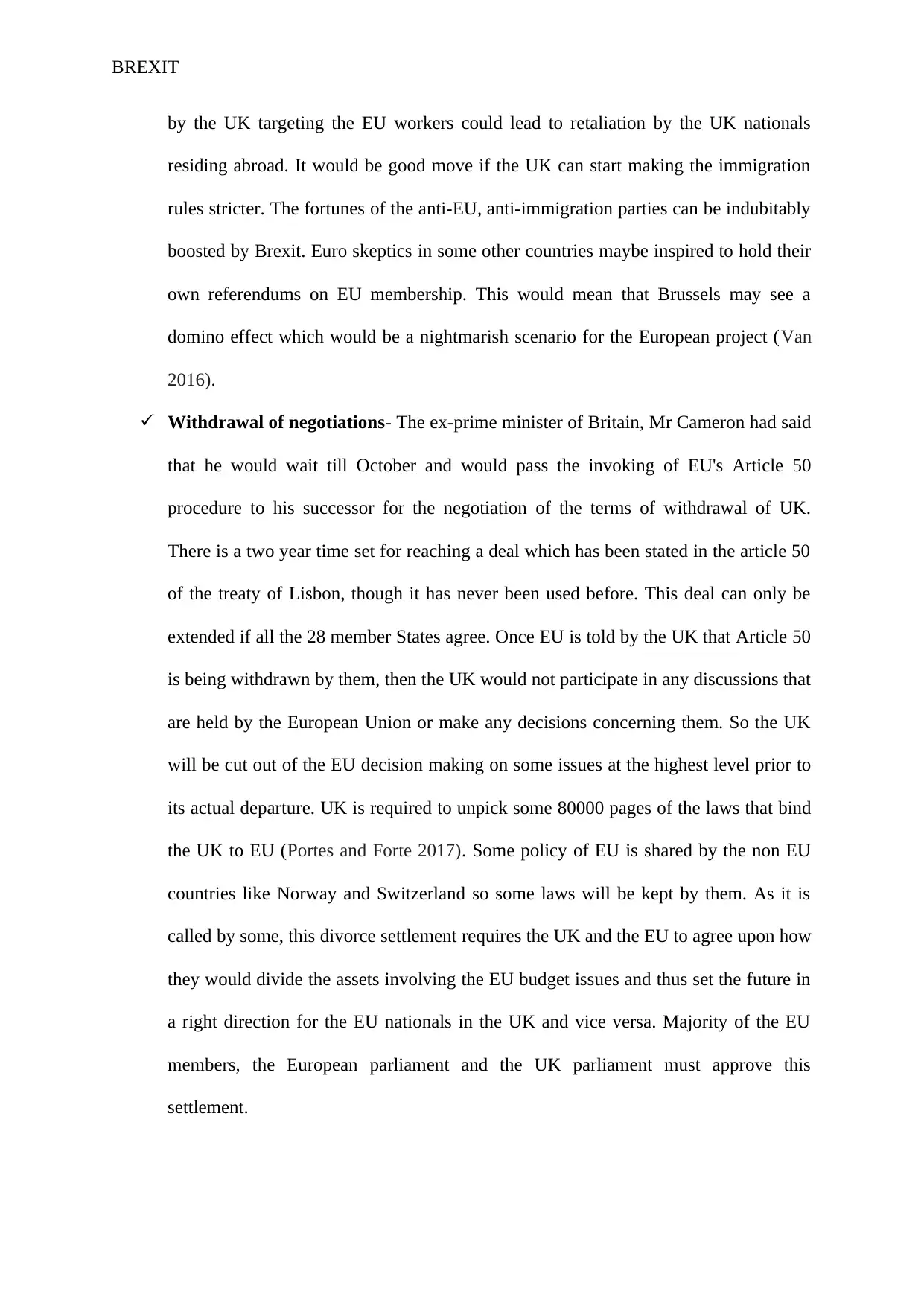
BREXIT
by the UK targeting the EU workers could lead to retaliation by the UK nationals
residing abroad. It would be good move if the UK can start making the immigration
rules stricter. The fortunes of the anti-EU, anti-immigration parties can be indubitably
boosted by Brexit. Euro skeptics in some other countries maybe inspired to hold their
own referendums on EU membership. This would mean that Brussels may see a
domino effect which would be a nightmarish scenario for the European project (Van
2016).
Withdrawal of negotiations- The ex-prime minister of Britain, Mr Cameron had said
that he would wait till October and would pass the invoking of EU's Article 50
procedure to his successor for the negotiation of the terms of withdrawal of UK.
There is a two year time set for reaching a deal which has been stated in the article 50
of the treaty of Lisbon, though it has never been used before. This deal can only be
extended if all the 28 member States agree. Once EU is told by the UK that Article 50
is being withdrawn by them, then the UK would not participate in any discussions that
are held by the European Union or make any decisions concerning them. So the UK
will be cut out of the EU decision making on some issues at the highest level prior to
its actual departure. UK is required to unpick some 80000 pages of the laws that bind
the UK to EU (Portes and Forte 2017). Some policy of EU is shared by the non EU
countries like Norway and Switzerland so some laws will be kept by them. As it is
called by some, this divorce settlement requires the UK and the EU to agree upon how
they would divide the assets involving the EU budget issues and thus set the future in
a right direction for the EU nationals in the UK and vice versa. Majority of the EU
members, the European parliament and the UK parliament must approve this
settlement.
by the UK targeting the EU workers could lead to retaliation by the UK nationals
residing abroad. It would be good move if the UK can start making the immigration
rules stricter. The fortunes of the anti-EU, anti-immigration parties can be indubitably
boosted by Brexit. Euro skeptics in some other countries maybe inspired to hold their
own referendums on EU membership. This would mean that Brussels may see a
domino effect which would be a nightmarish scenario for the European project (Van
2016).
Withdrawal of negotiations- The ex-prime minister of Britain, Mr Cameron had said
that he would wait till October and would pass the invoking of EU's Article 50
procedure to his successor for the negotiation of the terms of withdrawal of UK.
There is a two year time set for reaching a deal which has been stated in the article 50
of the treaty of Lisbon, though it has never been used before. This deal can only be
extended if all the 28 member States agree. Once EU is told by the UK that Article 50
is being withdrawn by them, then the UK would not participate in any discussions that
are held by the European Union or make any decisions concerning them. So the UK
will be cut out of the EU decision making on some issues at the highest level prior to
its actual departure. UK is required to unpick some 80000 pages of the laws that bind
the UK to EU (Portes and Forte 2017). Some policy of EU is shared by the non EU
countries like Norway and Switzerland so some laws will be kept by them. As it is
called by some, this divorce settlement requires the UK and the EU to agree upon how
they would divide the assets involving the EU budget issues and thus set the future in
a right direction for the EU nationals in the UK and vice versa. Majority of the EU
members, the European parliament and the UK parliament must approve this
settlement.
Paraphrase This Document
Need a fresh take? Get an instant paraphrase of this document with our AI Paraphraser
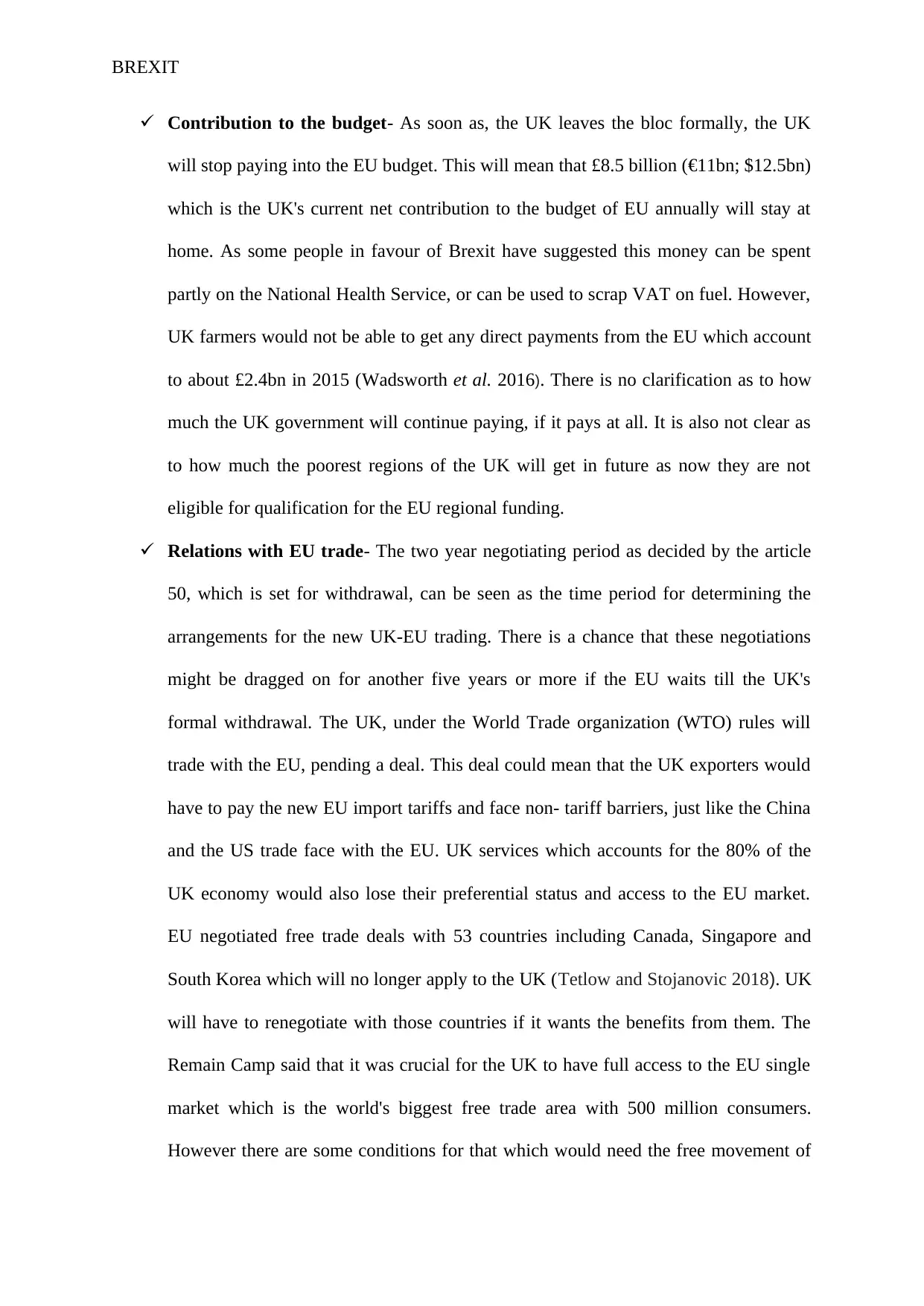
BREXIT
Contribution to the budget- As soon as, the UK leaves the bloc formally, the UK
will stop paying into the EU budget. This will mean that £8.5 billion (€11bn; $12.5bn)
which is the UK's current net contribution to the budget of EU annually will stay at
home. As some people in favour of Brexit have suggested this money can be spent
partly on the National Health Service, or can be used to scrap VAT on fuel. However,
UK farmers would not be able to get any direct payments from the EU which account
to about £2.4bn in 2015 (Wadsworth et al. 2016). There is no clarification as to how
much the UK government will continue paying, if it pays at all. It is also not clear as
to how much the poorest regions of the UK will get in future as now they are not
eligible for qualification for the EU regional funding.
Relations with EU trade- The two year negotiating period as decided by the article
50, which is set for withdrawal, can be seen as the time period for determining the
arrangements for the new UK-EU trading. There is a chance that these negotiations
might be dragged on for another five years or more if the EU waits till the UK's
formal withdrawal. The UK, under the World Trade organization (WTO) rules will
trade with the EU, pending a deal. This deal could mean that the UK exporters would
have to pay the new EU import tariffs and face non- tariff barriers, just like the China
and the US trade face with the EU. UK services which accounts for the 80% of the
UK economy would also lose their preferential status and access to the EU market.
EU negotiated free trade deals with 53 countries including Canada, Singapore and
South Korea which will no longer apply to the UK (Tetlow and Stojanovic 2018). UK
will have to renegotiate with those countries if it wants the benefits from them. The
Remain Camp said that it was crucial for the UK to have full access to the EU single
market which is the world's biggest free trade area with 500 million consumers.
However there are some conditions for that which would need the free movement of
Contribution to the budget- As soon as, the UK leaves the bloc formally, the UK
will stop paying into the EU budget. This will mean that £8.5 billion (€11bn; $12.5bn)
which is the UK's current net contribution to the budget of EU annually will stay at
home. As some people in favour of Brexit have suggested this money can be spent
partly on the National Health Service, or can be used to scrap VAT on fuel. However,
UK farmers would not be able to get any direct payments from the EU which account
to about £2.4bn in 2015 (Wadsworth et al. 2016). There is no clarification as to how
much the UK government will continue paying, if it pays at all. It is also not clear as
to how much the poorest regions of the UK will get in future as now they are not
eligible for qualification for the EU regional funding.
Relations with EU trade- The two year negotiating period as decided by the article
50, which is set for withdrawal, can be seen as the time period for determining the
arrangements for the new UK-EU trading. There is a chance that these negotiations
might be dragged on for another five years or more if the EU waits till the UK's
formal withdrawal. The UK, under the World Trade organization (WTO) rules will
trade with the EU, pending a deal. This deal could mean that the UK exporters would
have to pay the new EU import tariffs and face non- tariff barriers, just like the China
and the US trade face with the EU. UK services which accounts for the 80% of the
UK economy would also lose their preferential status and access to the EU market.
EU negotiated free trade deals with 53 countries including Canada, Singapore and
South Korea which will no longer apply to the UK (Tetlow and Stojanovic 2018). UK
will have to renegotiate with those countries if it wants the benefits from them. The
Remain Camp said that it was crucial for the UK to have full access to the EU single
market which is the world's biggest free trade area with 500 million consumers.
However there are some conditions for that which would need the free movement of
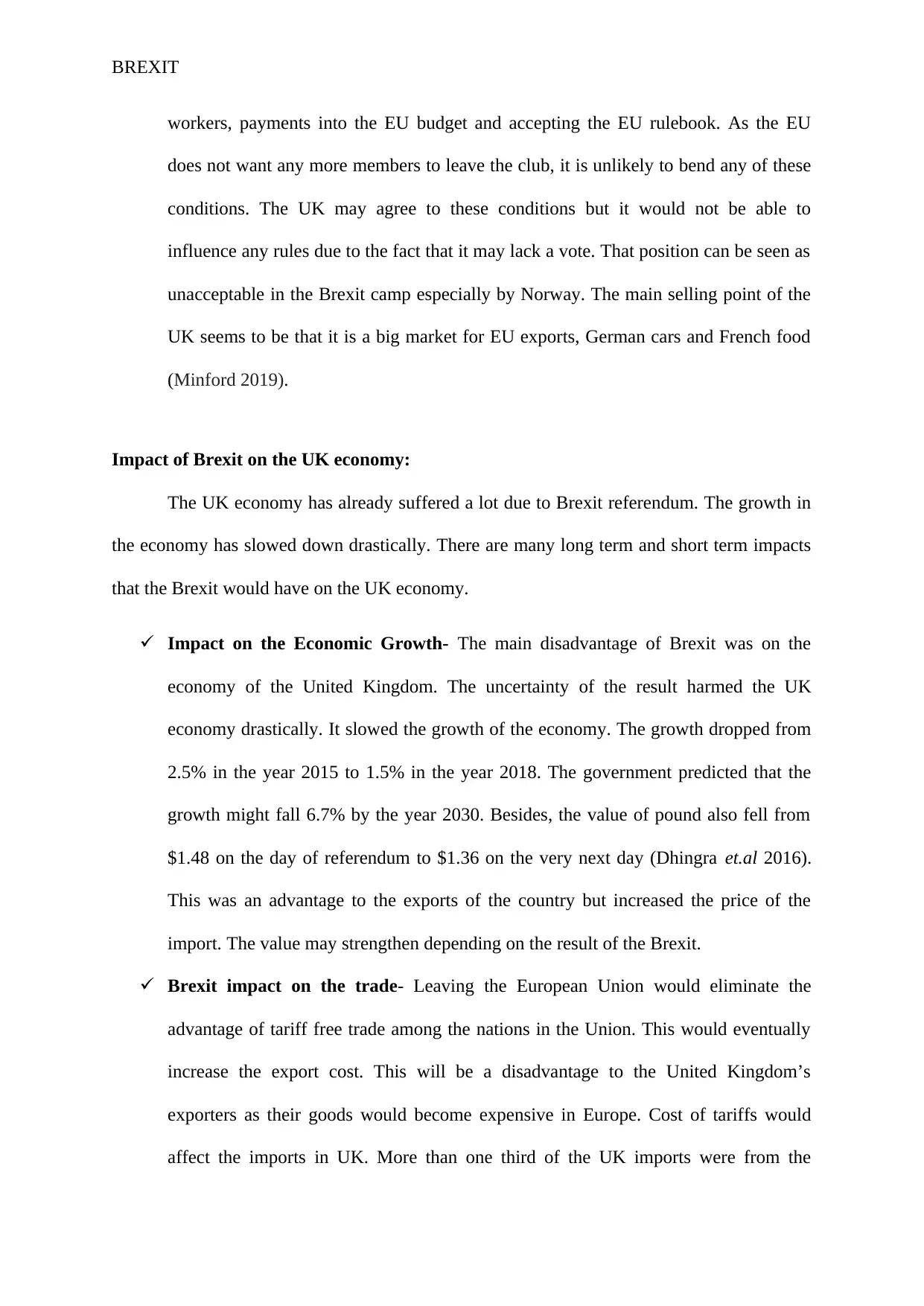
BREXIT
workers, payments into the EU budget and accepting the EU rulebook. As the EU
does not want any more members to leave the club, it is unlikely to bend any of these
conditions. The UK may agree to these conditions but it would not be able to
influence any rules due to the fact that it may lack a vote. That position can be seen as
unacceptable in the Brexit camp especially by Norway. The main selling point of the
UK seems to be that it is a big market for EU exports, German cars and French food
(Minford 2019).
Impact of Brexit on the UK economy:
The UK economy has already suffered a lot due to Brexit referendum. The growth in
the economy has slowed down drastically. There are many long term and short term impacts
that the Brexit would have on the UK economy.
Impact on the Economic Growth- The main disadvantage of Brexit was on the
economy of the United Kingdom. The uncertainty of the result harmed the UK
economy drastically. It slowed the growth of the economy. The growth dropped from
2.5% in the year 2015 to 1.5% in the year 2018. The government predicted that the
growth might fall 6.7% by the year 2030. Besides, the value of pound also fell from
$1.48 on the day of referendum to $1.36 on the very next day (Dhingra et.al 2016).
This was an advantage to the exports of the country but increased the price of the
import. The value may strengthen depending on the result of the Brexit.
Brexit impact on the trade- Leaving the European Union would eliminate the
advantage of tariff free trade among the nations in the Union. This would eventually
increase the export cost. This will be a disadvantage to the United Kingdom’s
exporters as their goods would become expensive in Europe. Cost of tariffs would
affect the imports in UK. More than one third of the UK imports were from the
workers, payments into the EU budget and accepting the EU rulebook. As the EU
does not want any more members to leave the club, it is unlikely to bend any of these
conditions. The UK may agree to these conditions but it would not be able to
influence any rules due to the fact that it may lack a vote. That position can be seen as
unacceptable in the Brexit camp especially by Norway. The main selling point of the
UK seems to be that it is a big market for EU exports, German cars and French food
(Minford 2019).
Impact of Brexit on the UK economy:
The UK economy has already suffered a lot due to Brexit referendum. The growth in
the economy has slowed down drastically. There are many long term and short term impacts
that the Brexit would have on the UK economy.
Impact on the Economic Growth- The main disadvantage of Brexit was on the
economy of the United Kingdom. The uncertainty of the result harmed the UK
economy drastically. It slowed the growth of the economy. The growth dropped from
2.5% in the year 2015 to 1.5% in the year 2018. The government predicted that the
growth might fall 6.7% by the year 2030. Besides, the value of pound also fell from
$1.48 on the day of referendum to $1.36 on the very next day (Dhingra et.al 2016).
This was an advantage to the exports of the country but increased the price of the
import. The value may strengthen depending on the result of the Brexit.
Brexit impact on the trade- Leaving the European Union would eliminate the
advantage of tariff free trade among the nations in the Union. This would eventually
increase the export cost. This will be a disadvantage to the United Kingdom’s
exporters as their goods would become expensive in Europe. Cost of tariffs would
affect the imports in UK. More than one third of the UK imports were from the
⊘ This is a preview!⊘
Do you want full access?
Subscribe today to unlock all pages.

Trusted by 1+ million students worldwide
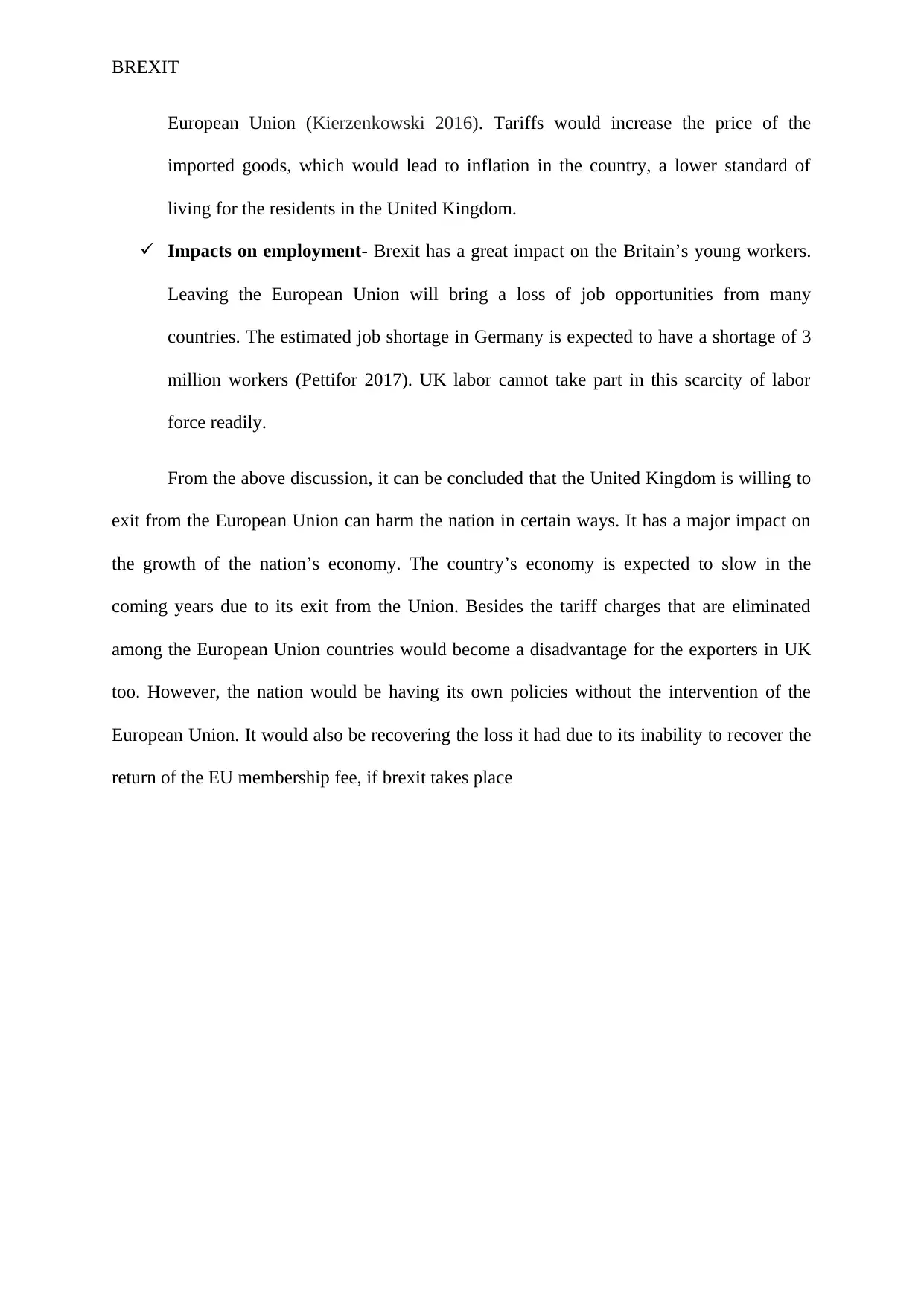
BREXIT
European Union (Kierzenkowski 2016). Tariffs would increase the price of the
imported goods, which would lead to inflation in the country, a lower standard of
living for the residents in the United Kingdom.
Impacts on employment- Brexit has a great impact on the Britain’s young workers.
Leaving the European Union will bring a loss of job opportunities from many
countries. The estimated job shortage in Germany is expected to have a shortage of 3
million workers (Pettifor 2017). UK labor cannot take part in this scarcity of labor
force readily.
From the above discussion, it can be concluded that the United Kingdom is willing to
exit from the European Union can harm the nation in certain ways. It has a major impact on
the growth of the nation’s economy. The country’s economy is expected to slow in the
coming years due to its exit from the Union. Besides the tariff charges that are eliminated
among the European Union countries would become a disadvantage for the exporters in UK
too. However, the nation would be having its own policies without the intervention of the
European Union. It would also be recovering the loss it had due to its inability to recover the
return of the EU membership fee, if brexit takes place
European Union (Kierzenkowski 2016). Tariffs would increase the price of the
imported goods, which would lead to inflation in the country, a lower standard of
living for the residents in the United Kingdom.
Impacts on employment- Brexit has a great impact on the Britain’s young workers.
Leaving the European Union will bring a loss of job opportunities from many
countries. The estimated job shortage in Germany is expected to have a shortage of 3
million workers (Pettifor 2017). UK labor cannot take part in this scarcity of labor
force readily.
From the above discussion, it can be concluded that the United Kingdom is willing to
exit from the European Union can harm the nation in certain ways. It has a major impact on
the growth of the nation’s economy. The country’s economy is expected to slow in the
coming years due to its exit from the Union. Besides the tariff charges that are eliminated
among the European Union countries would become a disadvantage for the exporters in UK
too. However, the nation would be having its own policies without the intervention of the
European Union. It would also be recovering the loss it had due to its inability to recover the
return of the EU membership fee, if brexit takes place
Paraphrase This Document
Need a fresh take? Get an instant paraphrase of this document with our AI Paraphraser
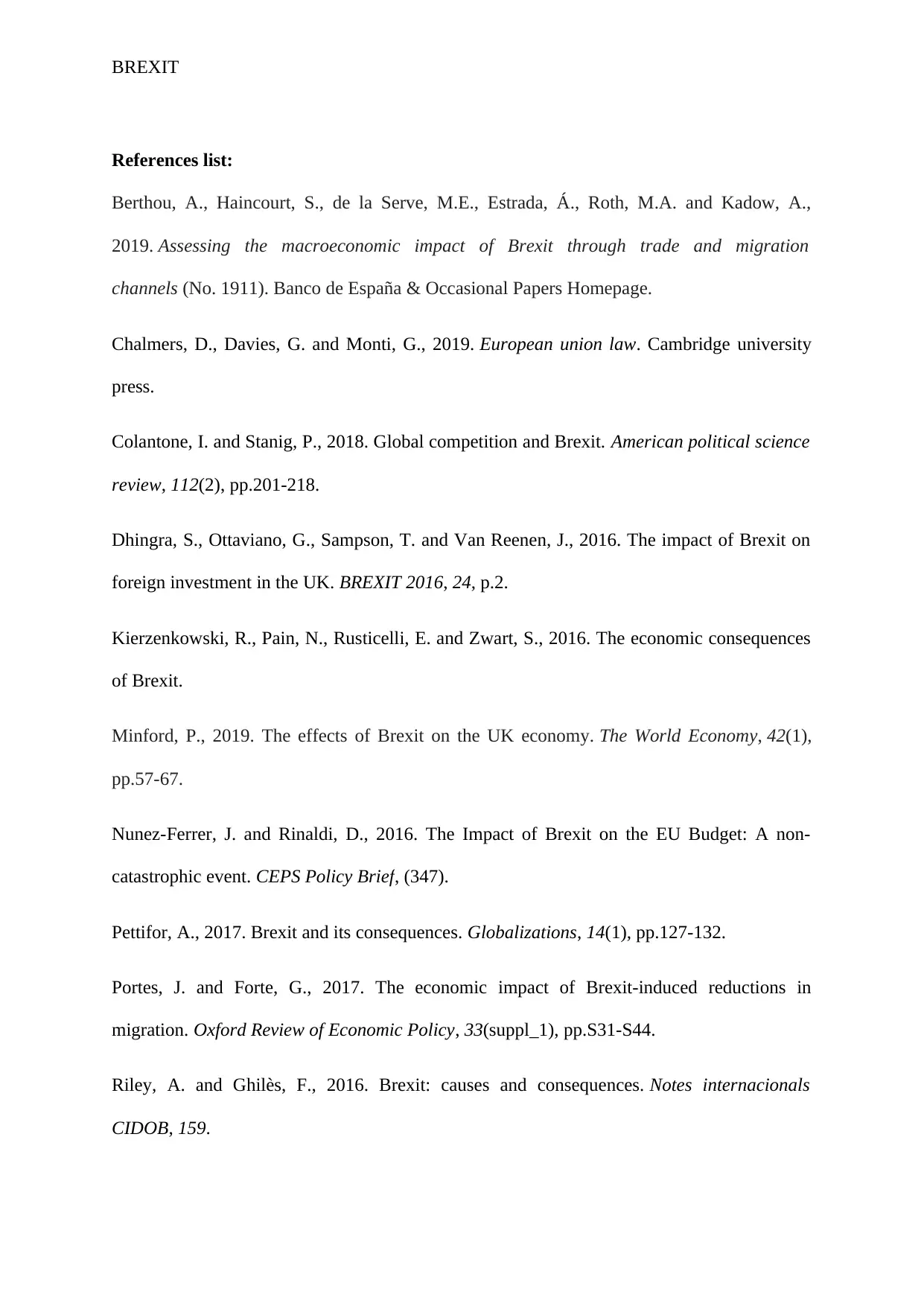
BREXIT
References list:
Berthou, A., Haincourt, S., de la Serve, M.E., Estrada, Á., Roth, M.A. and Kadow, A.,
2019. Assessing the macroeconomic impact of Brexit through trade and migration
channels (No. 1911). Banco de España & Occasional Papers Homepage.
Chalmers, D., Davies, G. and Monti, G., 2019. European union law. Cambridge university
press.
Colantone, I. and Stanig, P., 2018. Global competition and Brexit. American political science
review, 112(2), pp.201-218.
Dhingra, S., Ottaviano, G., Sampson, T. and Van Reenen, J., 2016. The impact of Brexit on
foreign investment in the UK. BREXIT 2016, 24, p.2.
Kierzenkowski, R., Pain, N., Rusticelli, E. and Zwart, S., 2016. The economic consequences
of Brexit.
Minford, P., 2019. The effects of Brexit on the UK economy. The World Economy, 42(1),
pp.57-67.
Nunez-Ferrer, J. and Rinaldi, D., 2016. The Impact of Brexit on the EU Budget: A non-
catastrophic event. CEPS Policy Brief, (347).
Pettifor, A., 2017. Brexit and its consequences. Globalizations, 14(1), pp.127-132.
Portes, J. and Forte, G., 2017. The economic impact of Brexit-induced reductions in
migration. Oxford Review of Economic Policy, 33(suppl_1), pp.S31-S44.
Riley, A. and Ghilès, F., 2016. Brexit: causes and consequences. Notes internacionals
CIDOB, 159.
References list:
Berthou, A., Haincourt, S., de la Serve, M.E., Estrada, Á., Roth, M.A. and Kadow, A.,
2019. Assessing the macroeconomic impact of Brexit through trade and migration
channels (No. 1911). Banco de España & Occasional Papers Homepage.
Chalmers, D., Davies, G. and Monti, G., 2019. European union law. Cambridge university
press.
Colantone, I. and Stanig, P., 2018. Global competition and Brexit. American political science
review, 112(2), pp.201-218.
Dhingra, S., Ottaviano, G., Sampson, T. and Van Reenen, J., 2016. The impact of Brexit on
foreign investment in the UK. BREXIT 2016, 24, p.2.
Kierzenkowski, R., Pain, N., Rusticelli, E. and Zwart, S., 2016. The economic consequences
of Brexit.
Minford, P., 2019. The effects of Brexit on the UK economy. The World Economy, 42(1),
pp.57-67.
Nunez-Ferrer, J. and Rinaldi, D., 2016. The Impact of Brexit on the EU Budget: A non-
catastrophic event. CEPS Policy Brief, (347).
Pettifor, A., 2017. Brexit and its consequences. Globalizations, 14(1), pp.127-132.
Portes, J. and Forte, G., 2017. The economic impact of Brexit-induced reductions in
migration. Oxford Review of Economic Policy, 33(suppl_1), pp.S31-S44.
Riley, A. and Ghilès, F., 2016. Brexit: causes and consequences. Notes internacionals
CIDOB, 159.
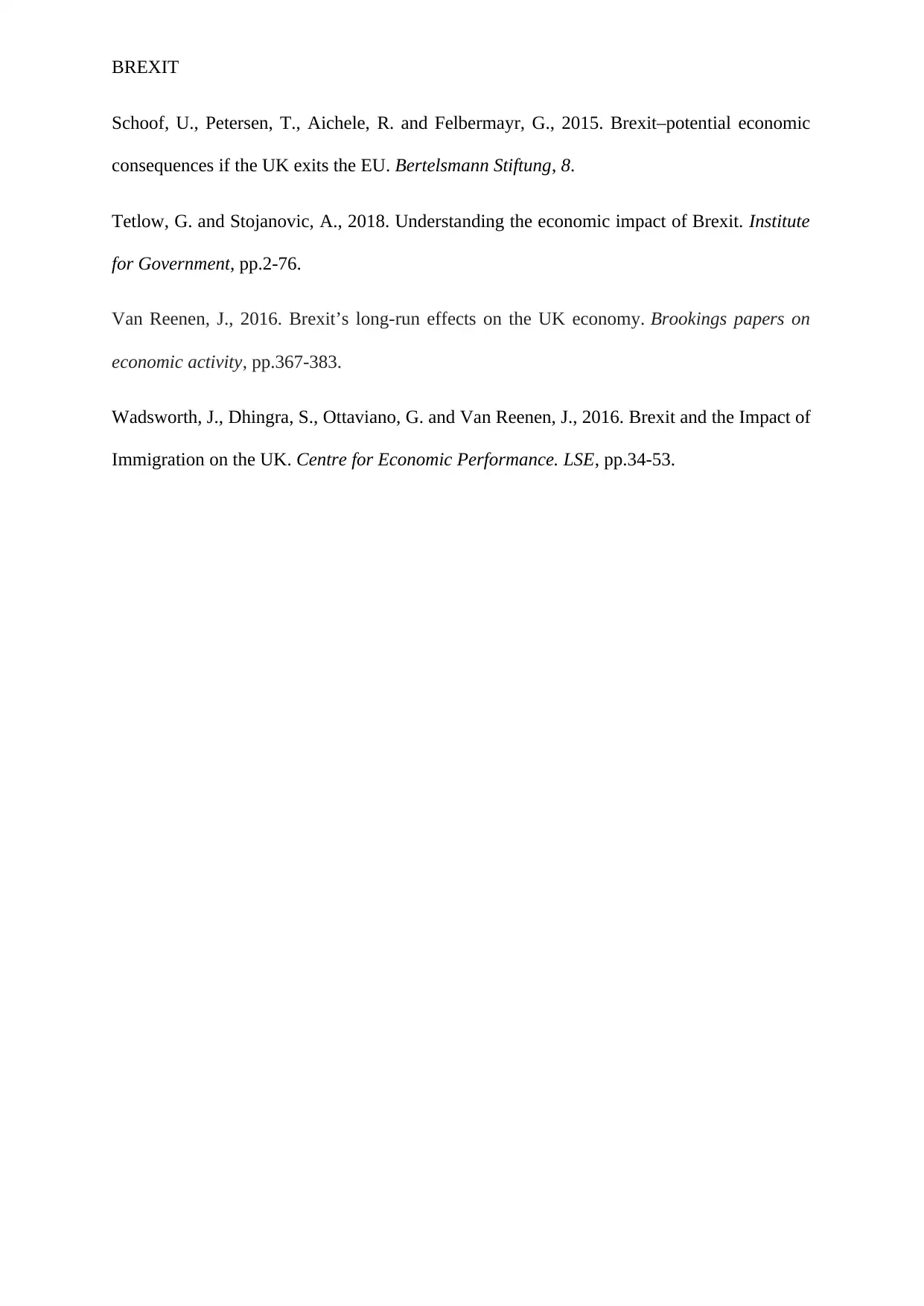
BREXIT
Schoof, U., Petersen, T., Aichele, R. and Felbermayr, G., 2015. Brexit–potential economic
consequences if the UK exits the EU. Bertelsmann Stiftung, 8.
Tetlow, G. and Stojanovic, A., 2018. Understanding the economic impact of Brexit. Institute
for Government, pp.2-76.
Van Reenen, J., 2016. Brexit’s long-run effects on the UK economy. Brookings papers on
economic activity, pp.367-383.
Wadsworth, J., Dhingra, S., Ottaviano, G. and Van Reenen, J., 2016. Brexit and the Impact of
Immigration on the UK. Centre for Economic Performance. LSE, pp.34-53.
Schoof, U., Petersen, T., Aichele, R. and Felbermayr, G., 2015. Brexit–potential economic
consequences if the UK exits the EU. Bertelsmann Stiftung, 8.
Tetlow, G. and Stojanovic, A., 2018. Understanding the economic impact of Brexit. Institute
for Government, pp.2-76.
Van Reenen, J., 2016. Brexit’s long-run effects on the UK economy. Brookings papers on
economic activity, pp.367-383.
Wadsworth, J., Dhingra, S., Ottaviano, G. and Van Reenen, J., 2016. Brexit and the Impact of
Immigration on the UK. Centre for Economic Performance. LSE, pp.34-53.
⊘ This is a preview!⊘
Do you want full access?
Subscribe today to unlock all pages.

Trusted by 1+ million students worldwide
1 out of 9
Related Documents
Your All-in-One AI-Powered Toolkit for Academic Success.
+13062052269
info@desklib.com
Available 24*7 on WhatsApp / Email
![[object Object]](/_next/static/media/star-bottom.7253800d.svg)
Unlock your academic potential
Copyright © 2020–2026 A2Z Services. All Rights Reserved. Developed and managed by ZUCOL.




